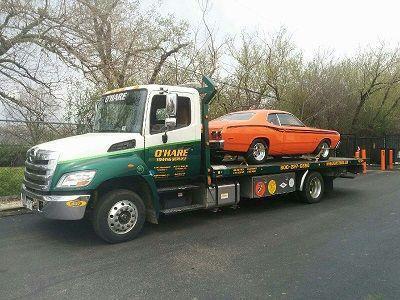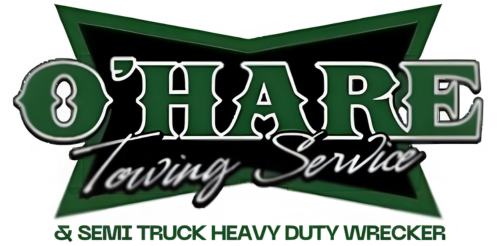During a Tow, Is It Hard On The Vehicle?

Towing a vehicle is a complicated undertaking with a definite learning curve, but how much do you need to worry when you leave it to the professionals?
It’s never a great day when your vehicle has to be towed, for any reason. But it will certainly go from bad to worse should the simple act of towing it actually cause further damage to your already damaged vehicle.
This isn’t an uncommon concern, but the truth is, while it’s possible for your car to experience harm, it’s not likely. However, this doesn’t mean you should completely let your guard down. It’s always a good idea to be aware of possible risks, just in case.
A fully certified and insured towing company handles most towed vehicles. This means that not only are the tow truck operators fully trained in their own vehicle, but more than likely, they’re comfortable assessing your vehicle and it’s proper towing needs.
While these days, flatbed towing is the norm; this wasn’t always the case. Engaging the wheels and rolling a vehicle from its stalled location to its next destination was far more common, and is still a regular practice today. If damage is going to happen, it will most likely happen with this type of towing.
Neutral Is Your Friend
When the tow truck arrives at your location, it’s likely that the driver will ask you to put your vehicle in neutral. If however, they neglect to give you this information, make sure that you place your vehicle in neutral.
A vehicle that remains in park and is towed with its wheels on the ground will absolutely experience damage. This is because the tires will be unable to turn while the vehicle is dragged along the road. Not only will this cause skidding and damage to the tires, but it can also cause damage to the connections between the wheels and the transmission, ultimately hurting the transmission itself.
But Neutral Isn’t A Perfect Solution
While a vehicle engaged in neutral is far less likely to experience damage as the result of a tow, it’s necessary to understand that damage is still possible. This is most likely to occur if the vehicle is transported too far with wheels on the ground.
While the neutral position disengages the engine, it doesn’t disengage the transmission from the wheels. Consequently, it’s possible for, over time, the turning wheels to cause the transmission to overheat because the engine isn’t available to help with regulation.
It’s unlikely that you would face this situation with the world of towing Oak Park, but nonetheless, it’s a good piece of knowledge to have stashed away in your mind should the situation arise.
Two-Wheel Drive Vehicles
When towing a two-wheel vehicle on the ground, it’s important to note the kind of transmission the vehicle has inside. In most cases, a vehicle with a manual transmission will be fine, no matter how many miles the vehicle is towed.
And as long as the vehicle is in neutral, most automatic transmission vehicles will also be okay for short distances, and some for longer distances. However, it’s never a bad idea to refer to your owner’s manual regarding towing specifications.
All-Wheel Drive Vehicles

Towing an all-wheel-drive vehicle is a far more unique situation. If any of the wheels are on the ground, the safest option is to temporarily remove the rear drive shaft and tow the vehicle with the rear wheels on the ground.
Again, the owner’s manual certainly contains specific instructions regarding the specific towing instructions for your make and model vehicle.
Better Safe Than Sorry
While most towing companies are well trained and well equipped, forewarned is always forearmed. Do not assume that the driver will tow your vehicle in the recommended fashion and don’t be afraid to speak up if they make a mistake.
Keeping the owner’s manual in the glove box is a great way to prop up your argument if the driver disagrees with your assessment of the towing situation.
However, an even better solution, and one that is becoming far more common, is to tow all vehicles on a flatbed tow truck. By doing this, the vehicle will likely be moved only feet (in neutral, of course) and the chances of damage at that point are nearly nonexistent.
Don’t Panic

If you find yourself in the position of needing a tow, but are hesitant because you’ve heard towing can damage your vehicle, know that chances are, your vehicle will be just fine. Don’t let unfounded fears convince you to do something far more dangerous, like attempt to drive the vehicle further than is safely possible.
Not only can this sort of decision lead to further, far more serious and expensive damage to your vehicle, depending on the original issues, it can also put you in a potentially unsafe situation.
Instead, pull over to a secure location, if possible. Retrieve the owner’s manual and look up the towing recommendations. Then, call your insurance or towing service and tell them what kind of towing service you need.
If you approach your situation with this level of care and caution, it’s likely that you will successfully navigate the pain that is a broken down vehicle. While you may have to wait a little longer for the precise tow truck to become available, your peace of mind is likely worth the price.
A broken down vehicle can cause all kinds of headaches, but further damage because of towing while always possible, is rare and quite unlikely. This is excellent news because odds are, if you need a tow truck, you already have enough problems and headaches for one day.
By utilizing the services of a reputable towing company, you can rest easy that your vehicle will arrive in its next location no worse off than it was when it was picked up.
